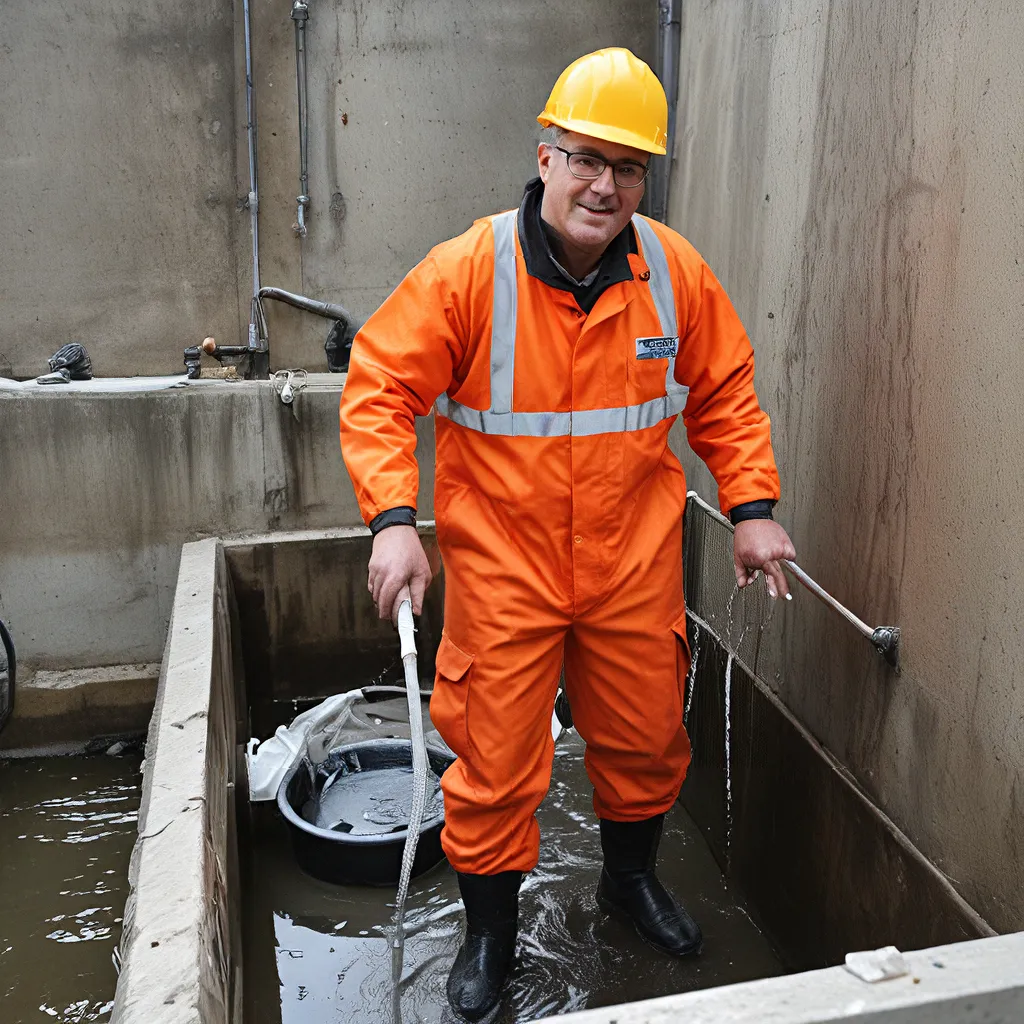
As someone who’s been in the wastewater treatment game for a while, I can tell you that it’s not all rainbows and unicorns. In fact, the folks working in this industry face some pretty serious health and safety risks on the job. But don’t worry, I’m here to spill the beans on how we can keep these unsung heroes safe and sound.
The Dirty Truth: Occupational Hazards in Wastewater Treatment
Let’s get real, folks – working with untreated wastewater is no walk in the park. These brave souls are exposed to all kinds of nasty stuff, like waterborne diseases, chemical hazards, and even physical dangers. And let me tell you, when that sewage hits the fan, it can really wreak havoc.
Take, for instance, the risk of contracting illnesses like diarrhea, vomiting, and stomach cramps. Yep, you heard me right. These workers are literally swimming in a sea of potential pathogens, and if they’re not careful, they could end up feeling like they’ve got a stomach bug that just won’t quit. And let’s not forget about the potential for exposure to tetanus, polio, typhoid fever, and hepatitis A and B – talk about a real party in the gut.
But it’s not just biological hazards that these folks have to worry about. Nope, they’re also dealing with all sorts of chemical threats, from the corrosive acids used in treatment processes to the toxic fumes that can build up in enclosed spaces. And let’s not forget about the physical dangers, like slips, trips, and falls, or the risk of injury from heavy machinery and equipment.
Gearing Up for Safety: Protective Equipment and Practices
Alright, so we’ve covered the scary stuff, but let’s talk about how we can keep these wastewater warriors safe and sound. The first line of defense is personal protective equipment (PPE). We’re talking about the whole shebang – gloves, goggles, face masks, and even full-body suits. These things may not be the most stylish, but they’re damn important when it comes to keeping those germs and chemicals at bay.
And it’s not just about the PPE, folks. These workers also need to be trained on proper hygiene practices, like washing their hands with soap and water after removing their gear. Because let’s be real, you don’t want to be spreading those nasty bugs all over the place, am I right?
But it’s not just about the individual workers – the facilities themselves also need to be up to snuff. That means having the right engineering and administrative controls in place, like proper ventilation systems and clearly marked safety protocols. And let’s not forget about the importance of regular risk assessments and worker health and safety plans – because when it comes to this industry, you can never be too careful.
Staying Vigilant: Vaccination and Medical Monitoring
Alright, so we’ve got the PPE and the hygiene practices covered, but what about those pesky diseases that can’t be so easily avoided? That’s where vaccination comes into play, folks. Tetanus, polio, typhoid fever, hepatitis A and B – these are all serious illnesses that can be prevented with the right shots. And you better believe that these wastewater workers need to have their immunizations up to date.
But it’s not just about the vaccines, you know. These workers also need to be on the lookout for any signs or symptoms of illness, like vomiting, stomach cramps, and watery diarrhea. And if they start feeling under the weather, they need to seek medical attention right away. Because trust me, you don’t want to be messing around with those waterborne diseases.
And let’s not forget about the importance of ongoing medical monitoring for these workers. Regular check-ups and screenings can help catch any potential health issues before they become a real problem. After all, prevention is always better than cure, am I right?
Staying Informed and Advocating for Change
Look, I know all of this might sound a little overwhelming, but trust me, it’s crucial stuff. These wastewater workers are literally on the frontlines of public health, and we need to make sure they’re getting the support and protection they deserve.
That’s why it’s so important for these folks to stay informed about the latest best practices and safety protocols in the industry. And let’s not forget about the importance of advocacy – these workers need to be speaking up and demanding the resources and training they need to stay safe on the job.
And let’s not forget about the role of the wastewater treatment services themselves. These companies need to be investing in the latest safety technologies and providing their workers with the tools and training they need to stay healthy and productive.
Because at the end of the day, these wastewater warriors aren’t just doing a job – they’re protecting our communities from the dangers of untreated sewage. And we owe it to them to make sure they’re able to do their work safely and effectively.
So there you have it, folks – the dirty truth about wastewater treatment and occupational health. But don’t worry, with the right precautions and a little bit of vigilance, we can keep these unsung heroes safe and sound. After all, they’re the ones who are keeping the crap at bay, and that’s pretty darn important if you ask me.